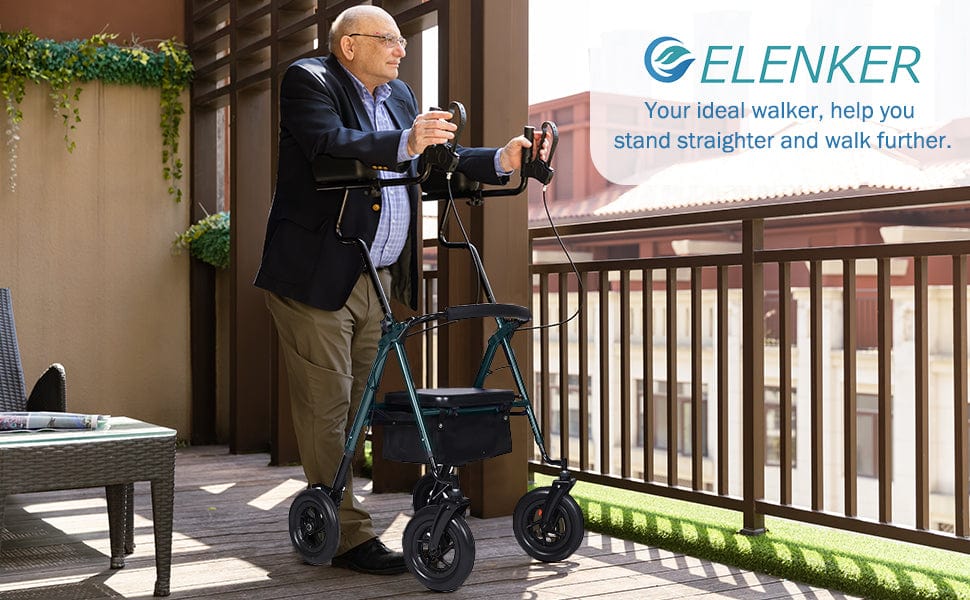Does a Rollator Walker Contribute to Poor Posture Over Time?
Apr 11, 2025
Alright, let’s talk about something you might’ve been wondering: If I use a rollator walker, will it mess up my posture over time? It’s a fair question. A lot of folks rely on walkers with wheels for mobility and support, especially as they get older or recover from an injury. But just like anything else, how you use it really matters.
No medical jargon, no confusing explanations—just straight-up real talk about your Rollator Walker and your posture.
First Off: What Is Poor Posture?
Before we blame the walker, let’s get on the same page about what Poor Posture even means.
Basically, posture is how you hold your body when you're standing, walking, or sitting. Good posture keeps your spine aligned and reduces strain on your muscles and joints. Poor posture, on the other hand, is when you’re slouching, leaning forward too much, rounding your shoulders, or sticking your head out like a turtle. Over time, that can lead to:
(1) Back and neck pain
(2) Tight muscles
(3) Trouble breathing
(4) Less balance and coordination
(5) You guessed it—more falls
Now, let’s talk about how a walker with seat can fit into that picture.
What’s a Rollator Walker, Again?
You’ve probably seen them around or even have one yourself. A Rollator Walker is that handy mobility device with four wheels, a set of handlebars, brakes, and usually a built-in seat. It helps folks stay active and independent, which is awesome.
Brands like Elenker make super popular models, especially the rollator walker with seat. These are great for taking breaks during walks or while shopping, giving you both support and comfort.
But here’s where it gets tricky - how you use it can either support your posture or slowly throw it off track.
So... Can a Rollator Walker Cause Poor Posture?
Yep, it can. But it’s not the walker’s fault - it’s all about the setup and habits.
Here are a few common ways your walker with seat might be contributing to bad posture:
1. Handlebars Too Low
If your walker’s handlebars are too low, you’ll end up hunched over like Quasimodo. That constant leaning forward puts a ton of pressure on your back and neck.
2. Leaning on the Walker Too Much
Some people treat their Rollator Walker like a shopping cart—leaning into it for support instead of standing tall. That habit might feel easier in the short term, but long term? It’s a fast track to Poor Posture and muscle weakness.
3. Not Engaging Core Muscles
When you rely too heavily on your rollator and don’t use your own body to stabilize, your core muscles start to check out. That makes it even harder to maintain upright posture without the walker.
4. Pushing It Too Far Ahead
This one’s sneaky. If you push your walker too far in front of you while walking, you naturally start leaning forward to catch up with it. And yep, that leads to—you guessed it—poor posture.
So What’s the Fix?
Here’s the good news: a Rollator Walker can actually help your posture—if you use it right. Seriously! You just need to make a few small tweaks.
Adjust the Height
When you’re standing upright, the handles should line up with your wrists. You should have a slight bend in your elbows—nothing dramatic. Not sure? Ask a physical therapist or someone at your local medical supply store to help you adjust it properly.
Stand Tall
Remind yourself to pull those shoulders back, engage your core, and keep your head up. You don’t want to be looking down at your feet all the time.
Stay Close
Keep your walker with wheels close enough so you’re not stretching or leaning forward to reach it. Your feet and the walker should move together in a nice, smooth rhythm.
Take Breaks, but Don't Overdo the Sitting
A rollator walker with seat is a total lifesaver when you need a break. But try not to sit too much. Staying active and upright helps keep your muscles engaged and your posture strong.
Strengthen Your Body
Even just a few minutes a day of gentle stretching, light core exercises, or walking upright (without hunching!) can make a huge difference. It helps keep everything aligned and reduces strain from relying too much on your rollator.
Why Elenker Rollators Are Worth a Look
Okay, so you’re trying to do everything right—should you consider a specific kind of walker? If you’re in the market, Elenker brand offers some pretty well-thought-out options. Their walkers with wheels come in different sizes and styles, including upright models that are actually designed to promote better posture.
If you’re worried about hunching or slouching, look for an upright walker with seat. These encourage you to walk tall, with handles higher up and more aligned with your natural posture.

Elenker Upright Rollator Walker
When to Ask for Help
Still not sure if your Rollator Walker is messing with your posture? Ask your doctor or a physical therapist for a quick posture and walker check-up. They’ll help you fine-tune your setup and might give you some exercises to keep everything in alignment.
Trust us - it’s worth the effort. Posture affects more than just how you look. It impacts your breathing, digestion, pain levels, and overall balance. Plus, standing tall just feels better.
So, does a Rollator Walker contribute to poor posture over time?
It can - but only if it’s not set up right or used properly. The truth is, your walker should be a helpful tool, not something that throws your body out of whack.
Make sure your handles are at the right height, don’t lean on it too much, keep it close when walking, and move with purpose. And if you’re shopping around, consider models like Elenker rollator walker with seat, which are built with posture and comfort in mind.
Take care of your body, and it’ll take care of you—rollator and all.











